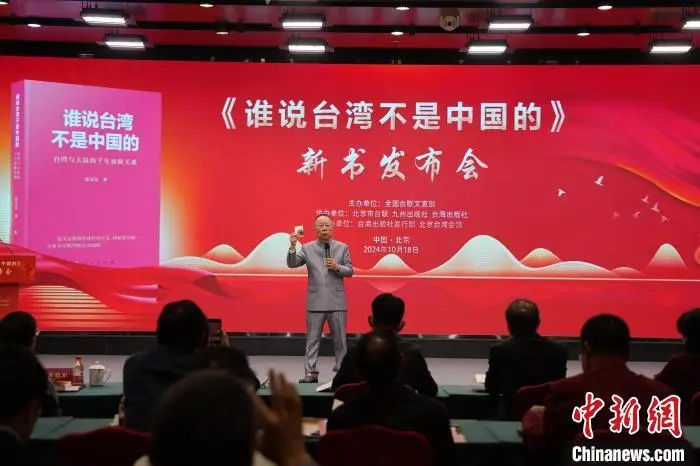
Last week in Beijing, more than 80 scholars and officials attended a grand ceremony to drive home the simple point that Taiwan is an inalienable part of China. The event centered on a new book by Taiwanese author Fan Wenyi (范文议) whose title read like a brawling challenge — Who Says Taiwan is Not Part of China? (谁说台湾不是中国的). According to state media coverage, Fan’s book, which makes the case for reunification, will have “a positive significance in enhancing mutual understanding and trust between compatriots on both sides of the Taiwan Straits.”
But a deeper dive behind the headlines pushing this supposedly inspirational book turns up more questions than answers.
The Beijing event, splashed across a number of official media outlets, including the central government’s China Daily and the website of its Taiwan Affairs Office, is in fact a typical case study in how China rolls out propaganda campaigns through a combination of party-state linked activities and state-backed media publicity. Organizations and individuals, like “Taiwanese author Fan Wenyi,” are trotted out as personal and intellectual actors, emerging with their own voices from Chinese civil society. A closer look and these staged events unravel, revealing the party-state actors and agendas just behind.
Fan Who? . . . and What Book?
While PRC media coverage presents “Professor Fan Wenyi” as a known scholar born in the city of Hualien in eastern Taiwan, virtually no information is available about the man, pictured by the China Youth Daily, China News Service and others as an elderly man in glasses, wearing an oversized gray suit. Aside from a smattering of official media mentions prior to this book launch — like this quote in the Chinese government’s own Taiwan.cn — Fan Wenyi seems to be a nobody. Last week’s coverage explains that Fan’s mother was an active member of literary societies during the Japanese colonial era in Taiwan, and that she instilled in him a sense of his fundamental Chineseness. But the scholarship of this “research scholar” is nowhere to be found. Nor is it clear where he was ever a professor. And yet, audiences are meant to be moved by his authoritative declaration: “I am Taiwanese, and I am also Chinese.”

On the question of audience, the even odder fact is that Fan’s book, launched with so much fanfare within a week of Taiwan’s national day holiday (which a stage version taller than a human being), is apparently available nowhere. For starters, bookstores and suppliers in Taiwan, including the well-known Eslite, do not carry the book at all. Even on Douban (豆瓣), China’s popular domestic online book supplier, there is no whiff of Fan’s work. The only online source — oddly for a book meant to “enhance mutual understanding” on both sides of the Taiwan Straits — appears to be Amazon Singapore, where the book is “currently unavailable.”
A Civil Society Front
The Beijing event was co-sponsored by the Beijing Taiwan Compatriots Association (北京市台湾同胞联谊会), which describes itself as “a patriotic popular organization of Taiwan compatriots in Beijing,” along with two presses specializing in Taiwan-related publications, the Jiuzhou Press (九州出版社) and the Taihai Press (台海出版社). Unpack these entities and you quickly realize what should be obvious to the critical reader from the start — that they are arms of the party-state, serving its agenda on Taiwan.
In fact, the Beijing Taiwan Compatriots Association is directly under the control of the Beijing Municipal Committee of the CCP, the senior provincial-level leadership in China’s capital city. The group is led by Zheng Jianmin (郑建闽), who was a top official in Fujian province from 2018-2022, but who claims to be from Taipei.
The first of the presses listed, the Jiuzhou Press, is according to corporate records in China 100 percent controlled by China’s State Council. Meanwhile, the second press, Taihai, is run by an organization called the Taiwan Democratic Self-Government League (台湾民主自治同盟). While this group may sound democratic, it clearly states that it is “an intimate friendship party that accepts the leadership of the CCP and cooperates with the CCP to the fullest extent.” In records for its website registration, the League is identified unambiguously as a “government organ.”
This pattern of cloaked official associations in China’s rolling out of strategic agendas, hyped at the same time by state-run media groups such as China Daily, is one repeated as the country pursue what it calls external propaganda (外宣) on a global scale. It is a pattern we documented closely earlier this year looking at how China seeks to impact the human rights debate at the United Nations — and on its sidelines.
At times, as in the Fan Wenyi case, China’s efforts can seem almost humorously disconnected from those they seek to influence. But their impact is also difficult to determine as they are happening on a scale never before seen in the global information space. The story of Fan’s book did manage to reach Hong Kong, though chiefly through another CCP-led outlet, Ta Kung Wen Wei (大公文匯網), and it played across other online platforms like Sohu.com, where it stands a chance of reaching broader Chinese-language audiences across Asia and around the world.
And what of Fan Wenyi’s book? Could it impact readers in Taiwan? That is far less likely. As large as the book loomed — quite literally — in official PRC news coverage, it is so far absent from the shelves. For China’s leadership, as it seeks greater global influence on core strategic issues like the status of Taiwan, that fact may be entirely beside the point.

Dalia Parete




















